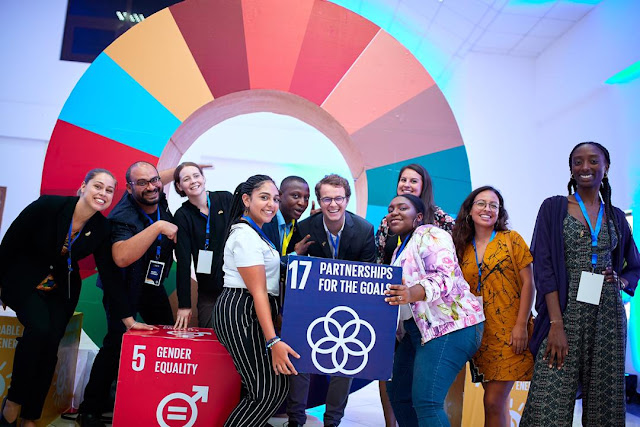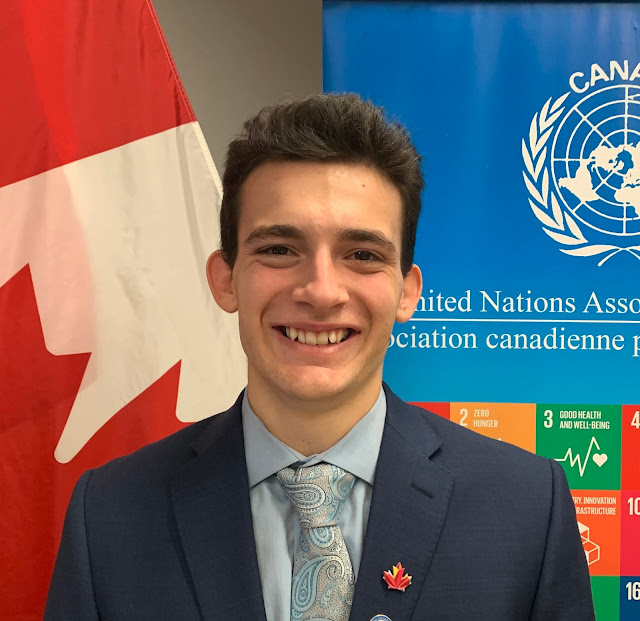Attending the First African SDG Youth Summit
Attending the First African SDG Youth Summit
Written by Michelle Meiklejohn
My position as junior professional
consultant at the International Organization for Migration (IOM) Ghana has led
to many unique professional opportunities. One such opportunity was when I got
to attend the First African Global SDG Youth Summit, which was held in Accra,
Ghana from 21-23 November 2019. The event was put on by the Office of the
President’s SDG Advisory Unit and Reset Global,
with support from the High Commission of Canada. One thousand youth from twenty
five countries were invited to attend.
The First African Global SDG Youth Summit
focused on how to achieve the Sustainable Development Goals, known as the SDGs,
by 2030. Keynote speakers and panelists spoke about SDG-related issues that
affect youth, especially pertaining to employment, development, health, gender
equity, ableism, and technology.
After introductory remarks were given, the
High Commissioner of Canada in Ghana, Sabine Nolke, took to the stage to give
her address. Afterwards, the Canadian delegation (which I was a part of) had
the opportunity to meet with the High Commissioner and ask her questions about
her background and her duties. She took a genuine interest in our group, asking
about our respective agencies and positions.
My favourite panel featured differently
abled people who spoke about accessibility in Ghana. While there is legislation
in place to give differently abled people special rights and protection, the
panel members argued that the legislature is not implemented effectively. The
session closed with a panelist reminding the audience that people are not born
‘disabled,’ rather, it is society’s failure to provide them with the right
tools that makes them so.
In another panel on youth’s role in
impacting the healthcare system with information and technology, Dr. Dorothy
Jeff-Nnamani gave a talk about how youth have a key role to play if they
position themselves at the center of healthcare, technology, and business. She explained
that in some rural areas of Ghana there is only one physician to several
thousands of patients. Therefore, she suggested, apps need to be developed to
relay medical information to rural populations since most villagers have access
to smart phones. Who are the most tech savvy? The youth. Youth, she said, can also
‘speak each other’s language;’ they know far better than any doctor how to
effectively transmit a message in a way that their peers will understand.
Many speakers, including speakers from the United
Nations Population Fund (UNFPA) panel, made mention of the fact that youth make
up 60% of the of the population in all of Africa. This puts the onus on young
African adults to leverage their creativity and energy to address major issues
facing the entire continent. Couple this with the fact that many West African
nations (including Ghana) operate as a gerontocracy – when power in political
structures are held by those who are the oldest. Because of that, today’s
leaders may not always prioritize youth, so it is especially important that
they advocate for their needs (and future).
A speaker from the UNFPA panel also
addressed how to challenge tokenism – when youth are included in a panel or on
a board as a tokenistic gesture so that their whole demographic is
‘represented.’ “Build your own capacity,” the panelist said, “take time to
build expertise in an area, be impressive, and older adults will start to take you
seriously.”
Highlighting the importance to work towards
achieving SDG 5 on Gender Equality, the final day of the summit had a gender
focus and featured all-female panels. A highlight of the conference was when
Pumla Mandela, the late Nelson Mandela’s granddaughter, made an address. Her
speech focused on how to use the SDGs to fight sexual and gender-based
violence. Pumla Mandela recounted her personal experience with sexual-assault,
and how it impacted everyone she knew. She told the audience that sexual
assault is endemic in South Africa – with an estimated 40% of South African
women raped in their lifetime. She acknowledged that it is a global issue, and
that women of colour are predominantly more at risk.
Pumla Mandela invoked SDGs #4 on quality
education, #5 on gender equality, and #16 on peace, justice, and strong
institutions, arguing that they are the most appropriate SDGs to counter
gender-based violence, though gender-related cut across all of the SDGs. Very
much in line with the global HerForShe campaign, she also stressed that boys
and men must be included in the discussion and become advocates if we are to
eradicate gender-based violence.
Overall, the SDG Youth Summit was
thought-provoking, and made evident some of the gaps to overcome, or
opportunities to be realized, that will have to come from youth themselves,
because it is their future at stake. For me, as an intern at IOM, it seems that
if there were more economic opportunities available to Ghanaian youth less of
them would feel the need to undertake the dangerous journey through the Sahara
desert, across the Mediterranean, and into Europe. I get the sense that many of
them would prefer to establish themselves in their native birthplace – if only
they were given an opportunity to do so.





Comments
Post a Comment